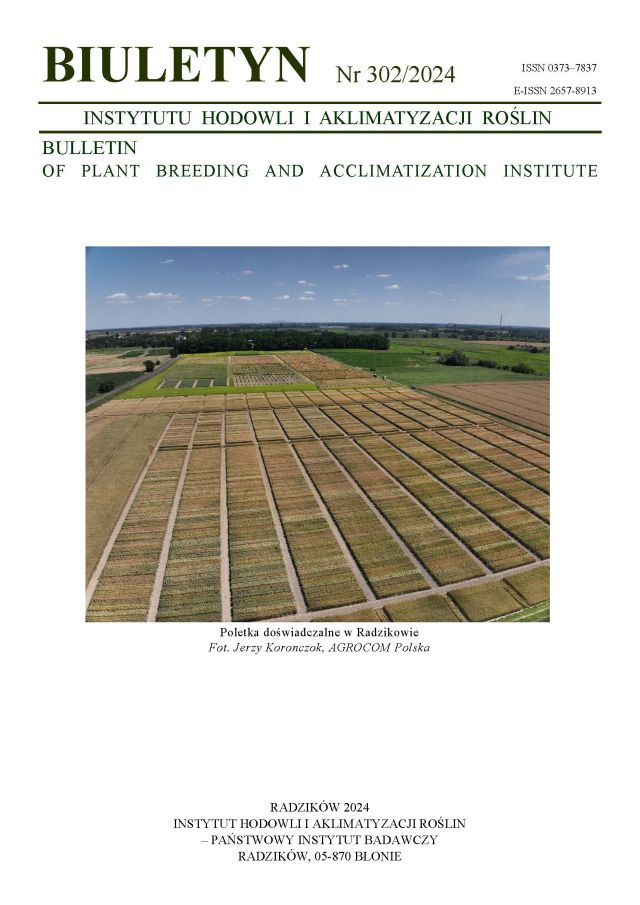Use of traditional and modern methods in the improvement of breeding material of sugar beet (Beta vulgaris L.)
Sandra Cichorz
s.cichorz@ihar.bydgoszcz.plPracownia Cytogenetyki i Metodyki Hodowli, Zakład Genetyki i Hodowli Roślin Korzeniowych, Instytut Hodowli i Aklimatyzacji Roślin — Państwowy Instytut Badawczy, Oddział w Bydgoszczy (Poland)
https://orcid.org/0000-0002-1161-3262
Małgorzata Malicka
Pracownia Cytogenetyki i Metodyki Hodowli, Zakład Genetyki i Hodowli Roślin Korzeniowych, Instytut Hodowli i Aklimatyzacji Roślin — Państwowy Instytut Badawczy, Oddział w Bydgoszczy (Poland)
https://orcid.org/0000-0002-3050-4184
Kamilla Kużdowicz
Pracownia Cytogenetyki i Metodyki Hodowli, Zakład Genetyki i Hodowli Roślin Korzeniowych, Instytut Hodowli i Aklimatyzacji Roślin — Państwowy Instytut Badawczy, Oddział w Bydgoszczy (Poland)
https://orcid.org/0000-0002-3288-8003
Barbara Skibowska
Pracownia Cytogenetyki i Metodyki Hodowli, Zakład Genetyki i Hodowli Roślin Korzeniowych, Instytut Hodowli i Aklimatyzacji Roślin — Państwowy Instytut Badawczy, Oddział w Bydgoszczy (Poland)
https://orcid.org/0000-0003-4789-6732
Maria Gośka
Pracownia Cytogenetyki i Metodyki Hodowli, Zakład Genetyki i Hodowli Roślin Korzeniowych, Instytut Hodowli i Aklimatyzacji Roślin — Państwowy Instytut Badawczy, Oddział w Bydgoszczy (Poland)
Abstract
This communication presents the most important achievements in the field of research issues carried out in the Laboratory of Cytogenetics and Methodology of Breeding, Department of Genetics and Plant Breeding of the Branch of the IHAR-PIB in Bydgoszcz. They include: production of doubled haploids, protection of gene resources, evaluation and selection of fungal resistant genres of Cercospora beticola Sacc. and identification of genotypes towards tolerance to drought stress in sugar beet (Beta vulgaris L.) breeding material.
Keywords:
wild species, gynogenesis, plant collections, doubled haploids, droughtReferences
Gośka M. 1997. Haploidy i podwojone haploidy buraka cukrowego (Beta vulgaris L.) oraz możliwości ich wykorzystania w hodowli. Monografie i Rozprawy Naukowe IHAR Nr 2.
Google Scholar
Stähle-Csech U., Gisi U. 1991. Determination of the sensitivity to DMI fungicides of Cercospora beticola on sugar beet. EPPO Bulletin 21: 321.
Google Scholar
Authors
Sandra Cichorzs.cichorz@ihar.bydgoszcz.pl
Pracownia Cytogenetyki i Metodyki Hodowli, Zakład Genetyki i Hodowli Roślin Korzeniowych, Instytut Hodowli i Aklimatyzacji Roślin — Państwowy Instytut Badawczy, Oddział w Bydgoszczy Poland
https://orcid.org/0000-0002-1161-3262
Authors
Małgorzata MalickaPracownia Cytogenetyki i Metodyki Hodowli, Zakład Genetyki i Hodowli Roślin Korzeniowych, Instytut Hodowli i Aklimatyzacji Roślin — Państwowy Instytut Badawczy, Oddział w Bydgoszczy Poland
https://orcid.org/0000-0002-3050-4184
Authors
Kamilla KużdowiczPracownia Cytogenetyki i Metodyki Hodowli, Zakład Genetyki i Hodowli Roślin Korzeniowych, Instytut Hodowli i Aklimatyzacji Roślin — Państwowy Instytut Badawczy, Oddział w Bydgoszczy Poland
https://orcid.org/0000-0002-3288-8003
Authors
Barbara SkibowskaPracownia Cytogenetyki i Metodyki Hodowli, Zakład Genetyki i Hodowli Roślin Korzeniowych, Instytut Hodowli i Aklimatyzacji Roślin — Państwowy Instytut Badawczy, Oddział w Bydgoszczy Poland
https://orcid.org/0000-0003-4789-6732
Authors
Maria GośkaPracownia Cytogenetyki i Metodyki Hodowli, Zakład Genetyki i Hodowli Roślin Korzeniowych, Instytut Hodowli i Aklimatyzacji Roślin — Państwowy Instytut Badawczy, Oddział w Bydgoszczy Poland
Statistics
Abstract views: 746PDF downloads: 285
License

This work is licensed under a Creative Commons Attribution-ShareAlike 4.0 International License.
Upon submitting the article, the Authors grant the Publisher a non-exclusive and free license to use the article for an indefinite period of time throughout the world in the following fields of use:
- Production and reproduction of copies of the article using a specific technique, including printing and digital technology.
- Placing on the market, lending or renting the original or copies of the article.
- Public performance, exhibition, display, reproduction, broadcasting and re-broadcasting, as well as making the article publicly available in such a way that everyone can access it at a place and time of their choice.
- Including the article in a collective work.
- Uploading an article in electronic form to electronic platforms or otherwise introducing an article in electronic form to the Internet or other network.
- Dissemination of the article in electronic form on the Internet or other network, in collective work as well as independently.
- Making the article available in an electronic version in such a way that everyone can access it at a place and time of their choice, in particular via the Internet.
Authors by sending a request for publication:
- They consent to the publication of the article in the journal,
- They agree to give the publication a DOI (Digital Object Identifier),
- They undertake to comply with the publishing house's code of ethics in accordance with the guidelines of the Committee on Publication Ethics (COPE), (http://ihar.edu.pl/biblioteka_i_wydawnictwa.php),
- They consent to the articles being made available in electronic form under the CC BY-SA 4.0 license, in open access,
- They agree to send article metadata to commercial and non-commercial journal indexing databases.
Most read articles by the same author(s)
- Sandra Cichorz, Maria Gośka, Perennial Grasses of the genus Miscanthus Anderss. — examples of own work , Bulletin of Plant Breeding and Acclimatization Institute: No. 287 (2019): Special issue
- Sandra Cichorz, Maria Gośka, Anna Litwiniec, Perennial grasses from the Miscanthus genus — potential source of renewable energy , Bulletin of Plant Breeding and Acclimatization Institute: No. 274 (2014): Regular issue
- Sandra Cichorz, Małgorzata Malicka, Maria Gośka, The research on the mechanisms responsible for gametic embryogenesis in sugar beet , Bulletin of Plant Breeding and Acclimatization Institute: No. 286 (2019): Special issue
- Kamilla Kużdowicz, Search for resistance to diseases among local populations of beet , Bulletin of Plant Breeding and Acclimatization Institute: No. 253 (2009): Regular issue
- Kamilla Kużdowicz, Conservation of genetic resources of wild form of beet (Beta vulgaris L.) , Bulletin of Plant Breeding and Acclimatization Institute: No. 283 (2018): Special issue
- Kamilla Kużdowicz, Adam Sitarski, Barbara Skibowska, Search for diseases resistance and abiotic factors in sugar beet genetic resources , Bulletin of Plant Breeding and Acclimatization Institute: No. 283 (2018): Special issue
- Maria Gośka, Teresa Krysińska, Krystyna Strycharczuk, The use of in vitro gynogenesis for obtaining sugar beet dihaploids , Bulletin of Plant Breeding and Acclimatization Institute: No. 234 (2004): Regular issue
- Barbara Skibowska, Selection of self-compatible genotypes in multigerm diploid populations of sugar beet , Bulletin of Plant Breeding and Acclimatization Institute: No. 234 (2004): Regular issue














